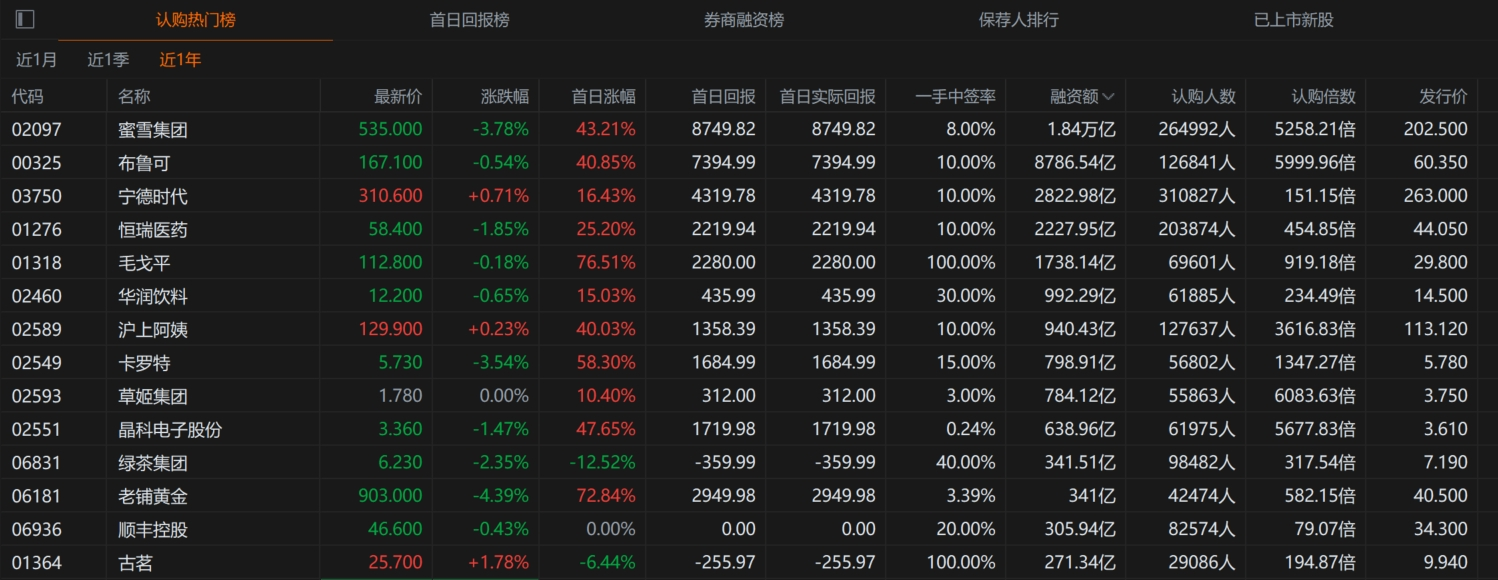The strategy of amplifying capital leverage through brokerage margin financing can improve the efficiency of capital use while controlling interest rates and costs.
In 2025, the new money-making effect of Hong Kong stocks will be significantly better than last year.
According to Wind statistics, as of the beginning of June, only 9 of the 31 listed new shares had broken, with a break rate of 29.03%, a significant decrease from 35.71% in the same period in 2024, and the median increase on the first day reached 13.3%.What is even more eye-catching is the first-day increase-Yingen Biotech surged 116.7% on the first day, with first-hand profits exceeding HK$11,000; Mixue Group, the parent company of Mixue Ice City, rose 43.21% on its first day of listing, earning HK$8750 per lot, and continued to climb after listing, with a cumulative increase of 189.38%.Ningde Times Hong Kong stocks raised HK$41 billion, accounting for 53% of the total IPO volume of HK$77.361 billion during the year. The steady performance of 16.43% on the first day has become a ballast for institutional capital allocation.

Regarding Hong Kong stocks hitting a new high this year, Doo Financial observed and attributed it to the following four points:
1. A+H has become a "new trend" and high-quality A shares have gone south to form a value anchor
The core feature of this year's Hong Kong stock IPO is the dual engine drive of "new consumption + hard technology", and the cross-border listing of leading A-share companies has formed a value anchor.In the consumer sector, Mixue Group has a scale advantage of 46,000 stores around the world and an annual output of 9 billion yuan, and a strategy of 66% fundraising for supply chain upgrades, reshaping investors 'valuation logic for the existing beverage industry; In the technology sector, A-share leaders such as Ningde Times and Hengrui Pharmaceutical generally have discounts when landing in Hong Kong stocks in the "A+H" model, leaving a margin of safety for innovation.None of the 5 A-share companies that have completed the secondary listing broke on the first day, among which Jihong shares rose 39.06% on the first day and Hengrui Pharmaceutical rose 25.2%. The strategy of discount issuance became the key to attract arbitrage funds.These companies have mature financial performance and industry status. For example, Hengrui Pharmaceutical International Placement has an excess demand of 17.09 times subscription and 454.85 times public subscription, highlighting the re-pricing of high-quality China assets by international capital.

2. Cornerstone investors build credit premium barriers
Hong Kong stocks 'unique cornerstone investor mechanism has played a role in pricing power in this year's market-top institutions use real money to lock in chips and bear a 6-12-month lock-up period, which is essentially an authoritative endorsement of the company's fundamentals.
Take the innovative pharmaceutical company Yingen Biotech as an example. Its cornerstone lineup includes international pharmaceutical companies such as BioNTech and Lilly Asia Fund, as well as head public offerings such as Fuguo and Yi Fund, forming a cross-market capital consensus.The cornerstone list of the Ningde era can be called an "All-Star"-Kuwait Investment Authority, Hillhouse Capital, UBS, Oak Capital, etc. jointly subscribed for a total of HK$20.371 billion, accounting for 66% of the fundraising amount. This high proportion of lock-in not only reduces selling pressure on circulation, but also conveys long-term confidence to the market.The deep participation of cornerstone investors optimizes the pricing game. According to statistics, the volatility of new shares with luxury cornerstone platforms after listing is significantly lower than the industry average, avoiding major ups and downs in stock prices.

3. Institutional dividends activate the liquidity engine
The FINI clearing platform launched by the Hong Kong Stock Exchange in November last year has reduced the pricing and trading time of new shares from T+5 to T+2, greatly improving capital efficiency.
Previously, when purchasing hot stocks, it was necessary to freeze trillion-level funds (for example, Mixue Group had frozen HK$1.83 trillion), and investors bore high financing interest; after the implementation of FINI, investors only needed to pay in advance the amount of the maximum number of shares that could be allocated. The improvement in capital efficiency directly boosted the enthusiasm of retail investors to participate.This year, the subscription multiples of consumer stocks such as Mixue Group and Shangshang Aunt reached 5324 times and 3616 times respectively, which is a typical case of institutional dividends stimulating liquidity.
The simultaneous reform of the pricing mechanism is biased towards institutions-the Hong Kong Stock Exchange requires that at least half of the offered shares be allocated to Jianbo placement, allowing institutional investors with professional pricing capabilities to dominate the game.For example, public subscriptions in Ningde Times account for only 7.5%, and institutions are allocated more than 90% of the shares. This distribution structure suppresses the valuation bubble caused by irrational speculation by retail investors.

4. High subscription multiple, high public placement sentiment
In Hong Kong stocks entering new markets with highly transparent information, subscription multiples have become a forward-looking indicator to predict first-day performance.
Retail investors can capture the popularity of funds and game trends through real-time subscription data released by securities firms.Among the 13 new shares that rose more than 10% on the first day of this year, subscriptions exceeding a hundred times have become common.Mixue Group's new trajectory is particularly typical: subscription exceeded HK$640 billion on the first day of the IPO, broke the historical record of HK$1.26 trillion on the third day, and finally closed the crown with HK$1.83 trillion, a subscription multiple of 5324 times.This fanaticism is not isolated-Ningde Times subscribed more than 120 times and frozen capital of 280 billion yuan; Hengrui Pharmaceutical received 454.85 times subscriptions, with a margin of more than 220 billion Hong Kong dollars.There are two logic behind the high subscription multiple: one is the facilitation of retail leveraged instruments (such as Doo Financial providing 10 times zero-coupon leveraged financing), and the other is the collective consensus of the market on scarce assets.

Looking to the future, the high-profile moment of Hong Kong stocks entering new markets will continue-currently, 158 companies are queuing up to go public, and leaders such as Dongpeng Beverage and Weil are ready to go.For investors, adapting to the new ecosystem requires strategic upgrades.Decentralized subscriptions and multi-account renewal have become necessary means to increase the winning rate. The strategy of amplifying capital leverage through margin financing by securities firms can improve the efficiency of capital use while controlling interest rates and costs.
What is more critical is to penetrate market noise and establish value anchors based on fundamentals-for example, focusing on hard indicators such as the proportion of R & D investment and cash flow health of the companies to be listed, rather than simply chasing industry hotspots.Currently, the Hong Kong Stock Exchange is piloting the "retail investor intention solicitation" system, which allows retail investors to submit non-binding quotations before IPO. If this reform can be implemented, it may partially bridge the information gap between institutions and retail investors.






